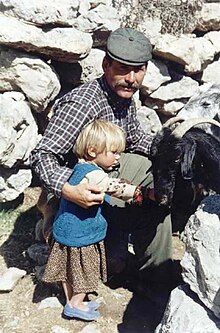Yörüks
The Yörüks, also Yuruks or Yorouks (Turkish: Yörükler; Greek: Γιουρούκοι, Youroúkoi; Bulgarian: юруци; Macedonian: Јуруци, Juruci), are a Turkish ethnic subgroup of Oghuz descent,[4][5] some of whom are nomadic, primarily inhabiting the mountains of Anatolia, and partly in the Balkan peninsula.[6] On the Balkans Yörüks are distributed over a wide area from southern Serbia, North Macedonia[7] parts of Bulgaria, north to Larissa in Thessaly and southern Thrace.[8][9] Their name derives from the Turkish verb yürü- (yürümek in infinitive), which means "to walk", with the word yörük or yürük designating "those who walk on the hindlegs, walkers".[10][11] The Yörüks were under the Yörük Sanjak, (Turkish: Yörük Sancağı) which was not a territorial unit like the other sanjaks, but a separate organisational unit of the Ottoman Empire.[12][13]
 A Yörük father with his daughter, Antalya | |
| Total population | |
|---|---|
| apprx. 3 million | |
| Regions with significant populations | |
| Anatolia, Balkans, East Thrace, Aegean Sea | |
| >1,000,000[1][2] (2011) | |
| 588,318 (2011 census)—1,500,000[3] (2019) | |
| 150,000[3] (2019) | |
| 150,000[3] (2019) | |
| 80,000[3] (2019) | |
| 27,000[3] (2011) | |
| Languages | |
| Turkish | |
| Religion | |
| Islam (Sunnism, Alevism), Bektashi, Tengrisim | |
| Related ethnic groups | |
| Turkish people and other Turkic peoples | |
Yörüks was settled in the Balkan especially in North Macedonia and the Amuca tribe in East Thrace, a subgroup of the Yörüks, at the time of Ottoman Empire, the yörük move into the Balkan mountains with their herds of sheep, Cows and goats, they live there on the alp called Yayla in Turkish, they make cheese from sheep and goat and cows Milk. Yörüks have preserved ancient turkish traditions such as Camel wrestling[14] and Turkish Oil Wrestling of Men.[15]According to some, those tribes residing in the east of the Kızılırmak river are called Turkmen people and those in the west Yörük. Both terms were used together in Ottoman sources for Dulkadirli Turkmens living in Maraş and its surroundings.[16] The ethnohistorical terms Turcoman and Turkmen are used synonymously in literature to designate Yörük ancestry.[5] Today they live mostly in houses in the valleys and plains and have preserved fair hair and a fair complexion, and blue or greyish-blue eyes of their Oghuz ancestors.[17][18][19] They hold many of their Pre-Islamic, old Tengrism culture in Lifestyle,[20] The Boys got a big Sünnet-celebration, and Yörük Festival is hold in Turkey at differet Places,[21].The majority now are settled but some live a semi-nomadic lifestyle. Yörük's Ancestry are proud of there Heritage and Background. There are several Yörük tribes. Generally Yörüks hold strictly Endogamy marriages.[22]